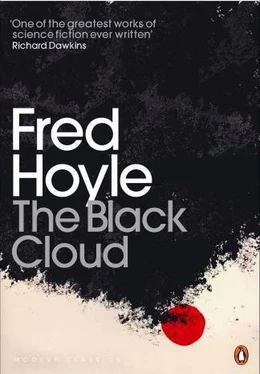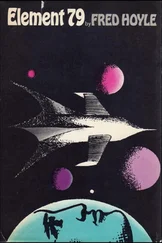Fred Hoyle - The Black Cloud
Здесь есть возможность читать онлайн «Fred Hoyle - The Black Cloud» весь текст электронной книги совершенно бесплатно (целиком полную версию без сокращений). В некоторых случаях можно слушать аудио, скачать через торрент в формате fb2 и присутствует краткое содержание. Жанр: Фантастика и фэнтези, на английском языке. Описание произведения, (предисловие) а так же отзывы посетителей доступны на портале библиотеки ЛибКат.
- Название:The Black Cloud
- Автор:
- Жанр:
- Год:неизвестен
- ISBN:нет данных
- Рейтинг книги:5 / 5. Голосов: 1
-
Избранное:Добавить в избранное
- Отзывы:
-
Ваша оценка:
- 100
- 1
- 2
- 3
- 4
- 5
The Black Cloud: краткое содержание, описание и аннотация
Предлагаем к чтению аннотацию, описание, краткое содержание или предисловие (зависит от того, что написал сам автор книги «The Black Cloud»). Если вы не нашли необходимую информацию о книге — напишите в комментариях, мы постараемся отыскать её.
The Black Cloud — читать онлайн бесплатно полную книгу (весь текст) целиком
Ниже представлен текст книги, разбитый по страницам. Система сохранения места последней прочитанной страницы, позволяет с удобством читать онлайн бесплатно книгу «The Black Cloud», без необходимости каждый раз заново искать на чём Вы остановились. Поставьте закладку, и сможете в любой момент перейти на страницу, на которой закончили чтение.
Интервал:
Закладка:
“This is all very well, Chris, but you’re not going to do anybody any good by killing yourself.”
“That’s absurd, and you know it. The stakes in this business are very high, they’re so high as to be worth playing for, even if the chance of winning isn’t very great. That’s point number one. Point number two is that maybe I stand a pretty fair chance. I’ve already been on to the Cloud, telling it to go much slower. It has agreed to do so. You yourself said that might avoid the worst of the trouble.”
“It might. Then again it might not. Also, if you avoid Weichart’s trouble, there may be other dangers that we know nothing about.”
“Then you’ll know about them from my case, which will make it easier for someone else, just as it is a little easier for me than it was for Weichart. It’s no good, John. I’m quite resolved, and I’m going to start in a few more minutes.”
McNeil saw that Kingsley was beyond persuasion.
“Well, anyway,” he said, “I take it you’ll have no objection to my staying here. It took about ten hours with Weichart. With you it’s going to take longer. You’ll need food in order to keep a proper blood supply to your brain.”
“But I can’t stop off to eat, man! Do you realize what this means? It means learning a whole new field of knowledge, learning in just one lesson!”
“I’m not suggesting that you stop off for a meal. I’m suggesting that I give you injections from time to time. Judging by Weichart’s condition, you won’t feel it.”
“Oh, I am not worried about that. Inject away if it makes you happy. But sorry, John, I must get down to this business.”
It is unnecessary to repeat the following events in detail, since they followed much the same pattern in Kingsley’s case as they had with Weichart. The hypnotic condition lasted longer however, nearly two days. At the end he was carried to bed under McNeil’s direction. During the next few hours symptoms developed that were alarmingly similar to those of Weichart. Kingsley’s temperature rose to 102°… 103°… 104°. But then it steadied, stopped, and, as hour followed hour, fell slowly. And as it fell, the hopes rose of those round his bed, notably McNeil and Ann Halsey who never left him, and Marlowe, Parkinson, and Alexandrov.
Consciousness returned about thirty-six hours after the end of the Cloud’s transmission. For some minutes an uncanny series of expressions flitted across Kingsley’s face: some were well known to the watchers, others were wholly alien. The full horror of Kingsley’s condition developed suddenly. It began with an uncontrolled twitching of the face, and with incoherent muttering. This quickly developed into shouting and then into wild screams.
“My God, he’s in some sort of fit,” exclaimed Marlowe.
At length the attack subsided under an injection from McNeil, who thereupon insisted on being left alone with the demented man. Throughout the day the others from time to time heard muffled cries which then died away under repeated injections.
Marlowe managed to persuade Ann Halsey to take a walk with him in the afternoon. It was the most difficult walk in his experience.
In the evening he was sitting in his room gloomily when McNeil walked in, a McNeil gaunt and hollow-eyed.
“He’s gone,” announced the Irishman
“My God, what a dreadful tragedy, an unnecessary tragedy.”
“Aye, man, a bigger tragedy than you realize.”
“What d’you mean?”
“I mean it was touch and go whether he saved himself. In the afternoon he was sane for nearly an hour. He told me what the trouble was. He fought it down and as the minutes passed I thought he was going to win out. But it wasn’t to be. He got into another attack and it killed him.”
“But what was it?”
“Something obvious, that we ought to have foreseen. What we didn’t allow for was the tremendous quantity of new material which the cloud seems able to impress on the brain. This of course means that there must be widespread changes of the structure of a mass of electrical circuits in the brain, changes of synaptic resistances on a big scale, and so on.”
“You mean it was a sort of gigantic brain-washing?”
“No, it wasn’t. That’s just the point. There was no washing. The old methods of operation of the brain were not washed out. They were left unimpaired. The new was established alongside the old, so that both were capable of working simultaneously.”
“You mean that it was as if my knowledge of science were suddenly added to the brain of an ancient Greek.”
“Yes, but perhaps in a more extreme form. Can you imagine the fierce contradictions that would arise in the brain of your poor Greek, accustomed to such notions as the Earth being the centre of the Universe and a hundred and one other such anachronisms, suddenly becoming exposed to the blast of your superior knowledge?”
“I suppose it would be pretty bad. After all we get quite seriously upset if just one of our cherished scientific ideas turns out wrong.”
“Yes, think of a religious person who suddenly loses faith, which means of course that he becomes aware of a contradiction between his religious and his non-religious beliefs. Such a person often experiences a severe nervous crisis. And Kingsley’s case was a thousand times worse. He was killed by the sheer violence of his nervous activity, in a popular phrase by a series of unimaginably fierce brain-storms.”
“But you said he nearly got over it.”
“That’s right, he did. He realized what the trouble was and evolved some sort of plan for dealing with it. Probably he decided to accept as rule that the new should always supersede the old whenever there was trouble between them. I watched him for a whole hour systematically going through his ideas along some such lines. As the minutes ticked on I thought the battle was won. Then it happened. Perhaps it was some unexpected conjunction of thought patterns that took him unaware. At first the disturbance seemed small, but then it began to grow. He tried desperately to fight it down. But evidently it gained the upper hand — and that was the end. He died under the sedative I was forced to give him. I think it was a kind of chain reaction in his thoughts that got out of control.”
“Will you have a whisky? I ought to have asked before.”
“Aye, I think now I will, thank you.”
As Marlowe handed over a glass, he said:
“Don’t you think Kingsley was a bad choice for this business? Wouldn’t someone of a far slighter intellectual calibre have really been more suitable? If it was contradictions between the old knowledge and the new that destroyed him, then surely someone with very little old knowledge would have done better?”
McNeil looked over his glass.
“It’s funny, it’s funny you should say that. During one of his later sane spells Kingsley remarked — I’ll try to remember his exact words — “The height of irony,” he said, “is that I should experience this singular disaster, while someone like Joe Stoddard would have been quite all right.” ”
Conclusion
“And now, my dear Blythe, I can again adopt a more personal style. Since your mother was born in the year 1966 and since the name of your maternal grandmother was Halsey, it will be clear that I have had reasons other than your interest in the Black Cloud for arranging that these documents be sent to you on the occasion of my death.
“Little more remains to be told. The Sun reappeared in the early spring of 1966, which was bitterly cold. But as the Cloud moved outwards from the Sun it took up such a shape as to reflect in the Earth’s direction a small proportion of the solar energy incident on it. This gave warm summer weather early in the month of May, which everyone found exceedingly welcome after the biting winter and spring. So the Cloud departed from the solar system. And so the episode of the Black Cloud, as it was ordinarily understood, came to an end.
Читать дальшеИнтервал:
Закладка:
Похожие книги на «The Black Cloud»
Представляем Вашему вниманию похожие книги на «The Black Cloud» списком для выбора. Мы отобрали схожую по названию и смыслу литературу в надежде предоставить читателям больше вариантов отыскать новые, интересные, ещё непрочитанные произведения.
Обсуждение, отзывы о книге «The Black Cloud» и просто собственные мнения читателей. Оставьте ваши комментарии, напишите, что Вы думаете о произведении, его смысле или главных героях. Укажите что конкретно понравилось, а что нет, и почему Вы так считаете.












